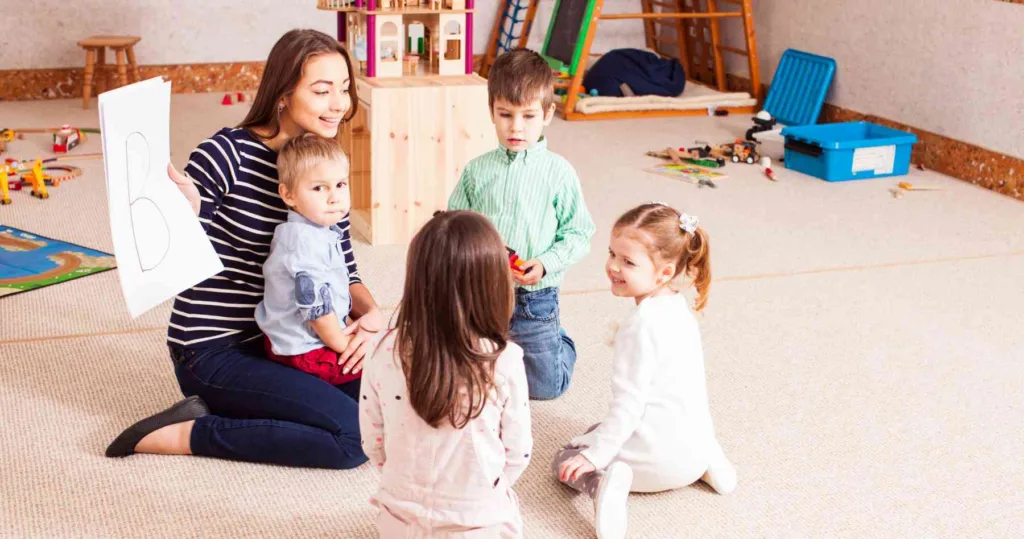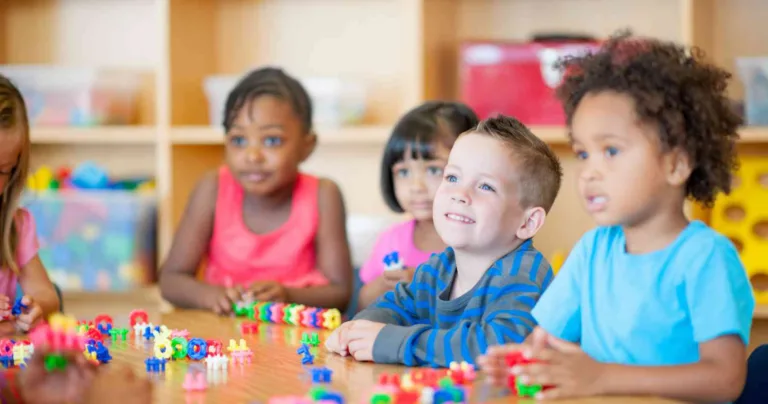Building Bright Futures: How Preschool Fosters Emotional Intelligence and Social Growth in Children
In this article, we delve into the realm of emotional intelligence and its profound impact on a child’s social-emotional growth. Preschool, as the foundation of a child’s educational journey, plays a pivotal role in nurturing emotional intelligence, a skill that will benefit them throughout life. By prioritizing self-awareness, empathy, and effective communication skills, preschools create an environment that fosters emotional intelligence development. This article explores the strategies employed by these centers and highlights the crucial role of trained educators in shaping a supportive and inclusive atmosphere through teaching emotional intelligence in the classroom.

Nurturing Emotional Intelligence: How Preschool Sets the Stage
Preschool lays the foundation for a child’s emotional intelligence by providing a conducive environment for exploration and learning. Children at this tender age are like sponges, absorbing information, emotions, and social cues from their surroundings.
Preschool: The Gateway to Childrens Emotional Intelligence
Preschool offers a structured setting where children engage in activities that promote emotional growth. Through play, interactions, and guided exercises, preschool supports your child’s social-emotional development while fostering a love for learning.
The Power of Emotional Intelligence
Emotional intelligence empowers children to understand their emotions and those of others. It helps them navigate relationships and develop coping mechanisms, essential for thriving in various life situations.
Strategies Employed by Preschools
Preschools employ various strategies to nurture emotional intelligence in young learners, creating a solid framework for their future growth.
Promoting Self-Awareness:
Preschool teachers encourage children to recognize and express their emotions in a healthy manner. Through storytelling, art, and discussions, children learn to identify their feelings and understand how they impact their actions and interactions.
Building Empathy:
Empathy is a cornerstone of emotional intelligence. Preschools focus on teaching children to step into others’ shoes, acknowledge different perspectives, and respond with compassion. Group activities and storytelling are often used to instill empathy in young hearts.
Encouraging Effective Communication:
Preschools prioritize developing communication skills as it is vital for healthy interactions. Children learn to express themselves clearly, actively listen to others, and resolve conflicts peacefully. Storytelling, show-and-tell, and group discussions enhance these skills.
Teaching Emotional Regulation:
Preschool educators help children manage their emotions constructively. Through gentle guidance and modeling, children learn to cope with frustration, anger, and disappointment, leading to emotional resilience.
Get In touch
Leave us a message
4 Claret Road, Table View, 7441
(021) 556 4146
office@applebeekids.com
The Role of Trained Educators
Trained educators are the backbone of emotional intelligence development in preschool settings. They play a significant role in creating a supportive and inclusive environment for children.
Creating a Safe Space:
Educators establish a safe and nurturing space where children feel comfortable expressing themselves. By providing a non-judgmental environment, children can freely explore their emotions and build trust with their teachers.
Practicing Positive Reinforcement:
Educators use positive reinforcement to acknowledge children’s emotional growth and display of empathy. Praise and encouragement boost children’s confidence and motivate them to continue developing their emotional intelligence.
Modeling Emotional Intelligence:
Trained educators lead by example, demonstrating emotional intelligence in their own interactions and responses. Children observe and learn from their teachers, picking up valuable social-emotional cues.
Individualized Attention:
Educators recognize that each child is unique and adapts their approach to cater to individual emotional needs. This personalized attention helps children feel seen, understood, and valued.
The Impact of Inclusive Environment
Preschools embrace diversity and create an inclusive environment where children from various backgrounds feel welcome and appreciated.
Celebrating Diversity:
Inclusive preschools celebrate different cultures, traditions, and family structures, promoting understanding and respect among children. This exposure fosters empathy and open-mindedness.
Empowering Children with Differences:
Educators teach children to embrace and appreciate differences, fostering a sense of belonging for every child. This empowers children with diverse backgrounds to participate fully and confidently in preschool activities.



Benefits of Early Childhood Education
Early childhood education offers a myriad of benefits that extend far beyond academic achievements. By teaching emotional intelligence in early childhood and social-emotional growth, preschools contribute significantly to a child’s overall development.
Cognitive Development: Early childhood education provides a stimulating environment where children engage in age-appropriate activities that enhance cognitive skills. From problem-solving to critical thinking, children develop a strong foundation for future academic success.
Social Skills: Preschool offers abundant opportunities for children to interact with peers and educators, honing their social skills. They learn to share, collaborate, and resolve conflicts, fostering positive relationships.
Emotional Regulation: Through guided emotional experiences, children learn to manage their emotions constructively. Emotional regulation helps them navigate stress, anxiety, and other challenges they may encounter later in life.
Communication Skills: Effective communication is crucial for self-expression and understanding others. Preschools encourage language development and communication in various settings, promoting confidence in children’s verbal and non-verbal expressions.
Self-Confidence: As children explore and learn in a supportive environment, they develop a sense of self-confidence. This newfound confidence empowers them to take on new challenges with enthusiasm.
Resilience: Early childhood education teaches children to adapt and bounce back from setbacks. They learn to approach problems with resilience and a positive attitude, laying the foundation for a growth mindset.
Creativity and Imagination: Preschools nurture children’s creativity and imagination through arts, storytelling, and imaginative play. This encourages innovative thinking and enhances their ability to think outside the box.
Love for Learning: By making education enjoyable and engaging, preschools instill a love for learning in children. This intrinsic motivation fuels their curiosity and sets them on a path of continuous learning.
Preparation for School: Early childhood education prepares children for formal schooling by helping them develop necessary skills and readiness for the academic environment.
In conclusion, early childhood education, with a strong focus on emotional intelligence and social-emotional growth, offers invaluable benefits for children’s holistic development. By providing a nurturing and stimulating environment, preschools set children on a path of excellence, fostering a love for learning and preparing them for a successful future.
ExcellentBased on 28 reviews
 Pieter Kotze2022-03-11Great pre-primary school in Table View, it has been there for many years and we are now on the verge of sending the 2nd generation there and although they have been around for years, the staff are current and up to date with the latest in childcare and early childhood education, peace of mind for sure...
Pieter Kotze2022-03-11Great pre-primary school in Table View, it has been there for many years and we are now on the verge of sending the 2nd generation there and although they have been around for years, the staff are current and up to date with the latest in childcare and early childhood education, peace of mind for sure... Gareth Bolt2021-08-20Jackie,Maude and Applebee team look after our little boy so wonderfully!
Gareth Bolt2021-08-20Jackie,Maude and Applebee team look after our little boy so wonderfully! Shakurah Hackley2021-08-20My son loves his teachers. They care for our kids and go the extra mile.
Shakurah Hackley2021-08-20My son loves his teachers. They care for our kids and go the extra mile. Nolu Mandindi2021-08-19My daughter been a student since 2019, her brother joined her in 2021, we couldn't be happier with the professionalism shown by the staff. The constant feedback from teachers on progress is on point.
Nolu Mandindi2021-08-19My daughter been a student since 2019, her brother joined her in 2021, we couldn't be happier with the professionalism shown by the staff. The constant feedback from teachers on progress is on point.
FAQs
Q: How does preschool enhance emotional intelligence?
A: Preschools employ various strategies such as promoting self-awareness, building empathy, encouraging effective communication, and teaching emotional regulation to enhance emotional intelligence in children.
Q: What is the importance of emotional intelligence in early childhood?
A: Emotional intelligence is vital in early childhood as it helps children understand and manage their emotions, build strong relationships, and develop essential coping skills, setting a strong foundation for future success.
Q: How do trained educators contribute to emotional intelligence development?
A: Trained educators create a safe and supportive environment, practice positive reinforcement, model emotional intelligence, and provide individualized attention, all of which contribute to emotional intelligence development in preschoolers.
Q: How does an inclusive environment impact a child’s emotional growth?
A: An inclusive environment celebrates diversity, empowers children with differences, and fosters empathy and acceptance, leading to enhanced emotional growth and a sense of belonging for all children.
Q: Can emotional intelligence be taught at an early age?
A: Yes, emotional intelligence can be nurtured from an early age through purposeful activities, positive interactions, and guidance from trained educators.
Q: How does emotional intelligence benefit children in the long run?
A: Emotional intelligence equips children with valuable life skills, enabling them to navigate challenges, build strong relationships, and lead a fulfilling and successful life.
Preschool sets the stage for nurturing emotional intelligence in children, helping them develop self-awareness, empathy, and effective communication skills. Trained educators play a crucial role in creating a supportive and inclusive environment where children thrive emotionally and academically. The impact of emotional intelligence learned in these formative years extends throughout a child’s life, equipping them to face future challenges with resilience and empathy.
